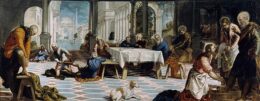The music this day is remarkable for a number of reasons. This is not a Sunday, so there is no Asperges. And since there is no Asperges, we sing the Introit (Nos autem) as the processional. Of course, since we are in Passiontide, we omit the Gloria Patri.
The priest is not wearing violet. Rather, he is wearing white, and so you might imagine that Mass XVII is probably not to be used and that is correct. The rubrics suggest that Mass IV be used and indeed is what we sing.
Holy Thursday is special because, even though it falls in Holy Week, it is a time of rejoicing since it commemorates the institution of the Mass, Holy Orders and the Blessed Sacrament of the Eucharist. In keeping with the somber side of things, the Kyrie is unaccompanied, but on the other hand, the Gloria is accompanied by the organ – the last time we will hear it until the Gloria at the Mass of the Paschal Vigil. The Gloria is also accompanied by a glorious ringing of the bells, but they too will disappear until the Gloria at the Mass of the Paschal Vigil. In place of the bells, you will hear the knocking of the clacker.
The Gradual (Christus factus est) is a recurring theme throughout Holy Week, and in particular, at Tenebrae. Given the dual nature of the feast, what follows the Gradual? Certainly not an Alleluia! Not during Lent, and certainly not during Holy Week. A Tract? Not on such a day of rejoicing! So, what follows the Gradual? Nothing! And that is a rarity indeed! We proceed directly from the Gradual to the Gospel.
There is no Credo because, even though it is a time of rejoicing, the day itself is a Feria, and the Credo is not said on days of Feria.
During the Washing of the Feet, the Schola sings a number of antiphons. We keep a close eye on the proceedings because as Father approaches the last of the Apostles, we start immediately with the Ubi Caritas, which is mandatory.
The Gloria Patri is omitted at the Lavabo. At the Offertory, we once again sing Stella Coeli Extirpavit. The Preface is that of The Holy Cross.
The character of the Mass has changed, and has now become more somber. This is very apparent as we sing the Agnus Dei. We repeat the phrase miserere nobis three times and do not sing dona nobis pacem.
The second Confiteor is omitted. At the Communion, the choir sings a polyphonic setting of the Gradual, Christus Factus Est. A very full church gave us time to also sing Adoro te Devote, in honor of the institution of the Eucharist.
Instead of the Ite Missa est, Father sings Benedicamus Domino. There is no Last Blessing and no Last Gospel. As soon as Mass is ended, the Blessed Sacrament is translated in procession to the Altar of Repose. We sing the Pange Lingua in procession, repeating verses 2 through 4 until we arrive at the Altar of Repose, at which time we sing verses 5 and 6, Tantum ergo. The procession returns to the Church for the Stripping of the Altar during which the Schola solemnly chants the now familiar Psalm 21 – Deus, Deus meus.
